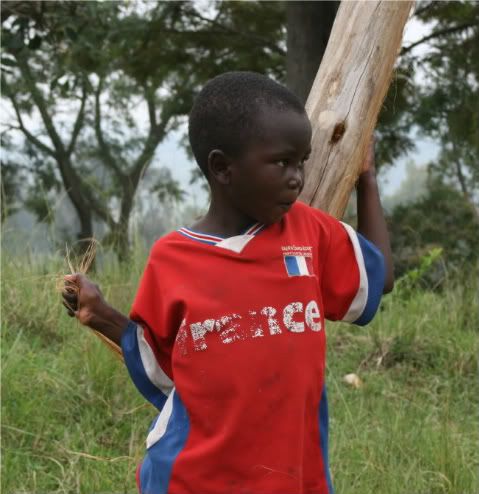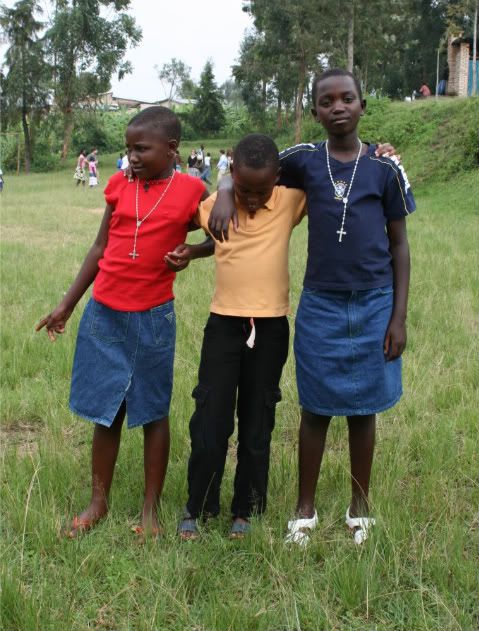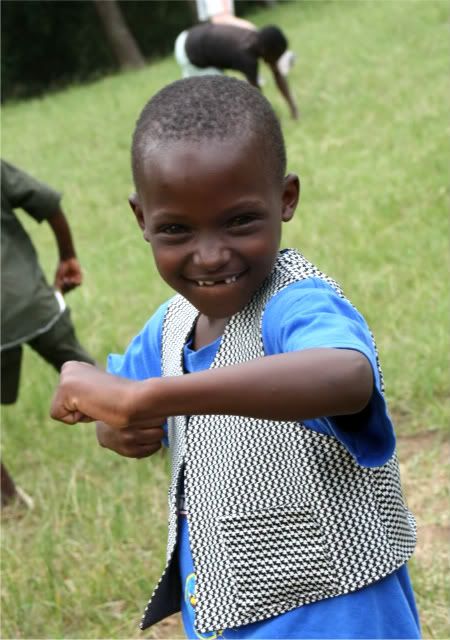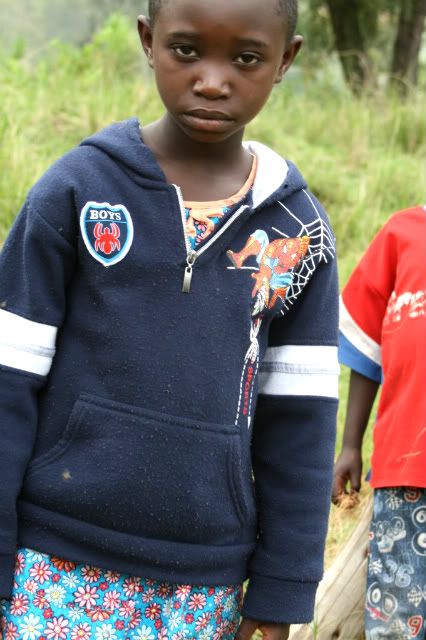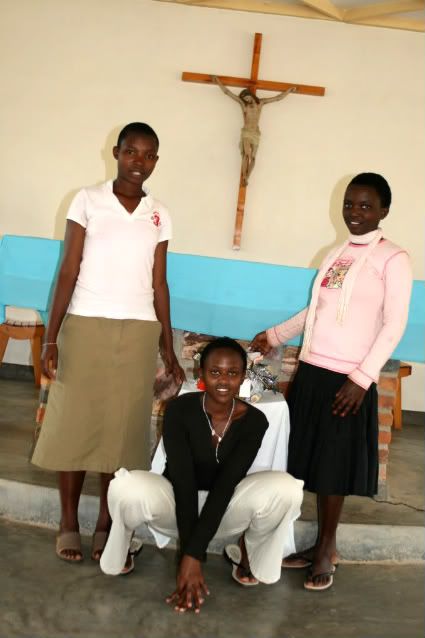In four hours begins the first day of my last term teaching at Ecole des Sciences de Musanze. I'm so nervously excited that I can't sleep. I also feel very strongly that I'm not ready to let my little birdies fly (and by little birdies, I mean students in their late teens/early twenties). I find myself fretting over the futures of these young men and women whom I didn't even know a mere 8 months ago.
Since I've arrived in Rwanda, I've learned a few lessons about patience, resourcefulness, hope, and helplessness. No matter how many classes I teach, no matter how many school materials I buy or collect, and no matter how many students I take to the hospital or buy medicine for, I still see the endless gulf between my happy vision for these students' futures and the probable reality of their lives. For my standout students, I've devoted extra effort toward ensuring that they're equipped for the next level of their educations. My new non-profit, African Learning Foundation (ALF), is one of the results of those efforts.
One of the goals of the African Learning Foundation is to maintain a scholarship fund for my brightest students as well as promising students from other schools. An essay written by one of my star PCM (Physics, Chemistry, Math) students was recently referenced in a a newspaper article about my school. Since he originally agreed to allow the distribution of this very personal essay because I told him it could help him obtain a scholarship to a US university, I would like to post it here and give my readers the chance to donate toward a scholarship for this student. I know that, if given the opportunity for a quality education, this bright, dynamic, and thoughtful young man will go far and be a true asset to his country.
ALF is a new non-profit and will not attain 501(c)3 status for at least 6 months; therefore donations are not tax-deductible. Donations through my sponsoring organization, WorldTeach, are tax-deductible and can be applied toward this fund until the end of the Rwandan school-year in October. For more information about ALF and how you can contribute to our scholarship fund or library project, please contact me at africanlearningfoundation@yahoo.com or through my personal email at emmalceck@yahoo.com.
Gentil's essay is written below:
I DO REMEMBER HIM
The year 1994 occurs in many history books because it is the year in which Rwandan genocide took place. Those books can help strangers to know what Rwanda have been passing through April of that strange year. For Rwandans, it is not the case only because that history is engraved on the principal capacity of their memories.
During that sad period, old, adult, children and even babies have been facing things over their imaginations—husband killing wife, grandfather killing grandsons and granddaughters, dogs hunting people as rabbits. It was not a habit to see corpses, especially children, but in April it became an obligation. Rwandans are no longer afraid of corpses because even now they still burying their people’s bodies from toilets to memorial sites found almost everywhere around the country. For strangers, the Rwandan genocide is over, but for Rwandans, it’s not yet over because their wounds are not yet healed.
I am Rwandan because my parents are Rwandan, but during that dark year, I was not in Rwanda. In 1995, I left the Democratic Republic of Congo with my whole family. We walked about 500 kilometers on foot from Congo to Rwanda and our first break was taken at a small land in Gisenyi, Rwanda called Gasiza. At the time, the place was not quiet because many times we could hear gun shots from morning until the night. We stayed there about two years and we were not rich and not yet poor because my father had a good job at Kigali and he used to come at Gasiza each last weekend of each month. Suddenly, the year 1997 was the year in which the great God that I couldn’t believe blinked over me because that’s when the Rwandan genocide’s consequences came over me as rain full of storms.
An excited last weekend, a smooth night away from night winds inside a live and colorful house, sitting around a plate but looking straight in my father’s eyes, my hand on my new shoes. “Gentil! Finish up your food and if you perform well at school I will bring you clothes next time. Your mother will call me if you won at school so that I may bring it to you” were my dad’s last sayings. How can I forget that promise? How can I forget his smooth voice? Until now, I am waiting for new clothes from him because I know and believe that we will meet again one day.
Those were his last words because immediately I did what he wanted and went to bed. I was happy that night, but that was the day on which I was awaked when in the steel night. Around 4:30am, I was awaked by shootings of all kinds of guns. Me and my two little brothers were on the same bed and when we awoke, we went immediately in the father’s room and we met him halfway well dressed because he was ready to leave for Kigali. He said, “Don’t be afraid,” just because he believed that nothing will happen as usual. But it was not the case.
Looking through the window, there was many soldiers wearing their uniform who dad said were government soldiers. I couldn’t believe that because as I used to pass most of my time in their camp, I knew almost all of them and those were only new faces. We were used to that, so that my father told my mom that he is going out to check and ask those soldiers, but he holded my youngest brother in his hands.
He opened the door, and we were looking at him through the window when the soldier saw him. He pointed the gun at my father and told him to sit down. My mother obliged us to hide under the bed, me and my brothers in her room and my two sisters in another room. She continued to look at her husband in the hands of wolves. I didn’t see it, but suddenly she left the window saying, “He is dead! The soldier shooted at him!” Then she started crying.
I realized that what I noticed was true: those soldiers were not government soldiers but Interahamwe, who were soldiers fighting against FPR and most of them were accused of genocide. “They kills Tutsi,” said my sister, and I knew that if they kill my father, it’s because he is Tutsi. And if my father is a Tutsi, it means that even me, I am Tutsi. Our door was broken by means of a big stone and when the soldiers entered the house my mother was on her bed crying. “Another snake to kill here,” said a girl voice. “No!” claimed a man, “She have first to give us her husband’s uniform and gun.” I was under the bed and all I could see is their feet. My mother told them that my father was not a soldier, but they didn’t accept. One of the soldiers said to my mother to put her hands on a table and he nailed her hands on that table. Without saying any other word, my mom said, “My husband is not a soldier.”
“Hello. They are coming? Copied. Let’s move; their gods are coming,” said the girl again. Immediately everyone left, but one soldier told my mother to give him money so that he may bring her the young man in the hands of his father’s corpse. She gave him about 75.000 FRW ($150) and he brought the young man to his mom. With armor on the ground, helicopters in the sky, the Interahamwe escaped through forests and mountains.
My mother called me and I removed the nails from her hands. Government soldiers came and evacuated almost everyone but my mother refused to move so I did too. As soldiers were helping her with her hands, she told me to go and check what happened to my grandfather’s house. When entering the house, I saw my little uncle breathing his last breath. His father was already dead on the bed, his mother behind a cupboard with a knife in the head, and his sister with his brother without heads. That day my father, grandfather, grandmother, two uncles, and two aunties died.
By the help of two men we dug a hole in which we buried all of them. The great part of my family was buried at Gasiza and when I go back sometimes at Gasiza, it’s not because I like that place. I will never get tired of waiting for my father’s promise and I know that I will see him at the right time.
Gentil Kalisa
Senior Six, PCM









































